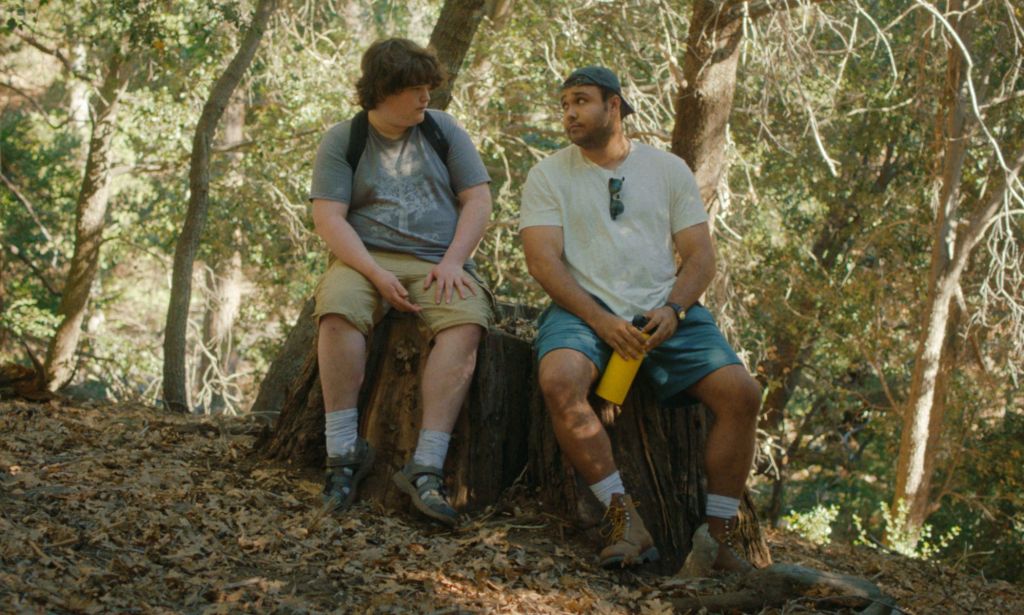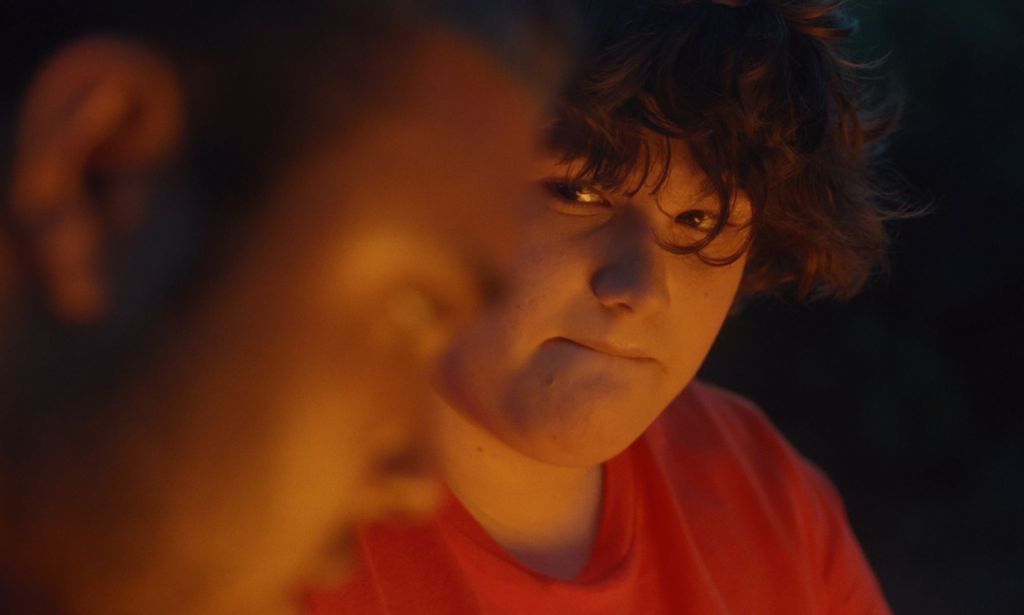Big Boys director Corey Sherman on masculinity, belonging and celebrating big, queer bodies on screen

Jamie falls for Dan in Corey Sherman’s heartwarming coming of age comedy Big Boys. (Supplied)
Corey Sherman’s new film Big Boys debuts at London’s LGBTQ+ film festival BFI Flare this weekend (18 and 19 March). In a PinkNews exclusive, the director discusses body positivity, subverting the queer coming-of-age trope, and media depictions of bigger bodies.
When writer and director Corey Sherman was piecing together his latest film Big Boys, his top priority was creating something he never saw as a queer “chubby” teenager: a coming-of-age film that celebrated bigger queer bodies.
In a world of Love, Simon’s and Call Me By Your Name’s where protagonists are thin, white and conventionally attractive, Sherman felt his own experience wasn’t being reflected on screen.
“I almost never saw anything that showed bigger people respect and treated their stories as if they were just as important as the thinner characters, and that their characters were as worthy of romance,” Sherman tells PinkNews. “If the character was big and likeable, then they were just the sidekick or they were just a complete joke.”
The ‘fat funny friend’ trope has plagued our screens for decades, robbing fatter people, and particularly fatter queer people, of the opportunity to see multi-dimensional representations of themselves. With Big Boys, Sherman is righting that wrong.

Big Boys follows cooking enthusiast Jamie, a closeted, endearingly awkward 14-year-old, who joins his brother Will and cousin Allie on a camping trip. They’re joined by Allie’s boyfriend Dan, a tent-building, mountain-hiking man’s man, who Jamie slowly begins to fall for.
It’s funny, warm, and expertly shows mainstream media that larger people like Dan are sexually attractive. Beyond that, though, it swaps the typical coming-of-age narrative for one that most queer people resonate with.
Instead of giving us the firework-exploding, bell-ringing moment à la Heartstopper where the young and in love get together, Big Boys tells a story of unrequited queer desire; because in reality, the awkward 14-year-old almost never gets the straight guy, and Dan is a very straight, 26-year-old guy.
Quite simply, there’s no ribbon-tied ending for Jamie; and it’s very refreshing to see.
”It would have been really helpful to see a movie that said ‘it’s OK to have this experience,” Sherman says, explaining that he, like Jamie, had countless crushes on straight friends.
“It’s still very worthwhile. There’s hope at the other end of it. You can still get through this with a feeling of dignity… what’s happening to you is still important, even if it feels like it doesn’t measure up to what you’re seeing your straight peers have.”

Don’t be mistaken, though; this isn’t a tale of a chubby, insecure teenager lusting after a toxic straight man.
It’s not a tale rooted in queer trauma, either. Throughout the film, Dan treats Jamie with compassion and friendship, to an emotional degree.
“I wanted to make something that looked at the relationship between gay and straight men, which is, in movies, often so fraught and so full of pain and disconnect,” Sherman says, explaining that instead, he wanted to depict a relationship built on “harmony and mutual respect”.
“There’s something very deep about the pressure to be straight-acting”
There’s also no grand, cliched coming out scene between Jamie and his family, marking another move away from the queer coming-of-age blueprint. Instead, it’s a quiet reflection on the uncomfortable positions young LGBTQ+ people find themselves in when confronted by discussion of sexuality or masculinity.
Jamie’s experience was very much founded in Sherman’s own; when the topic of girls came up in conversation with friends in high school, he had a roll call of female celebrities to cite (“Charlize Theron was always the person I would go to as a default”).
“There’s something very deep about the way that the pressure to be straight-acting remains,” Sherman reflects. “It’s something that still comes to me to this day, as something that I have to process and reckon with.”
But again, in a subversion of tired tropes, Jamie doesn’t try to parrot forced masculinity for too long, for this is a film about someone “settling into their own sense of self”.

Early on, Jamie struggles to take his t-shirt off to swim in the lake. By the end of the film, he’s topless, and nothing more is said of it.
He’s comfortable in his own skin, and that’s captured best in one scene where Jamie fantasises about getting with Dan when he’s older.
“When he manifests himself in the future,” Sherman explains, “he’s not a thin supermodel. He’s still a big guy. That’s part of who he is, and he doesn’t find that’s something that he needs to get rid of to be attractive.”
Onscreen depictions of nuanced, bigger characters are improving but Sherman believes there’s still an undeniable “stigma”.
“[There’s a] lack of conversation around the fact that people are attracted to bigger people – I think it’s a lot more common than we’re led to believe,” Sharman states. “Film and television could do a lot more to show that different people are attracted to all different kinds of other people.”
“Just because I was big then – and I still am – I’d have felt this feeling of being validated, and being shown that my body is attractive too”
Portrayals of larger bodies are topical right now, following Brendan Fraser’s recent Oscar win for his role as 600-pound gay man Charlie in The Whale. Many have criticised the film for putting Fraser in a fat suit.
Sherman enjoyed Fraser’s performance, but wishes fatter actors had been given the opportunity to reach Fraser’s level of stardom and take on the role themselves.
“There’s so much conversation around casting people who can relate to or are the types of people that are in the story… I think the stories themselves would just be much more enriched by having someone who’s experience it was, being that way,” he argues.
“I really do hope that we get to the point where we can push past that. It’s definitely still too common and just doesn’t really make sense.”
For anyone disheartened by how the media still depicts fat people, Big Boys is a worthwhile watch.
“It would have been really validating to have seen [Big Boys] as a kid,” Sherman summarises.
“I would have felt a lot less alone in my attraction. Also, just because I was big then – and I still am – I’d have felt this feeling of being validated, and being shown that my body is attractive too.”
Big Boys debuts at the BFI Flare Film Festival this weekend (18 and 19 March).

